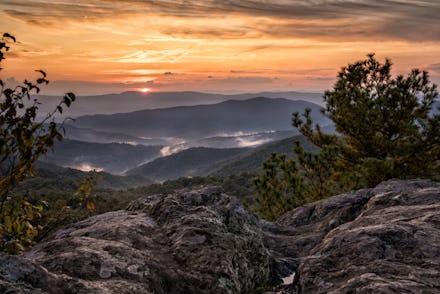Some trash people are trashing national parks during a pandemic

Coronavirus lockdowns are making everyone a little stir-crazy. But while most of us are dealing with the isolation by streaming bizarro selections on Netflix or sadly dancing alone in our $100 million mansions, others are apparently taking their boredom out on national parks around the U.S. With most retail stores and entertainment venues closed to reduce the risk of crowds during the pandemic, heading outside for a breath of fresh air has become one of the more popular government-approved options to stave off restlessness. Unfortunately, according to a new report by National Geographic, this has led to an increase in trespassing, vandalism, and arson in national parks.
Some incidents are relatively harmless, like people driving past barriers and signs to hike in closed areas, pulling donuts in parking lots, or speeding through the parks. But others are more serious: In Missouri, the Ozark National Scenic Riverways was recently hit by an arsonist who caused a wildfire that threatened a home on the property.
The pause in visitors has given park employees the opportunity to finish up overdue maintenance, such as painting and deep-cleaning facilities or tidying trails. But the vandals and trespassers don’t help the staff much with any damage or junk they leave behind.
There's "trash, lots of trash, more than usual," Shenandoah National Park spokesperson Sally Hurlbert told National Geographic. "We're trying to keep up with the sanitation, but it's putting our rangers at risk every time they have to pick up a piece of garbage alongside the road and empty trash cans, because [COVID-19] can survive for a period of time on cardboard and plastic surfaces."
The U.S. isn't the only country with trespassing problems in its parks. National parks in Africa are expecting an increase in poaching due to the lockdowns. According to Earther, the lack of tourism has not only cleared out the parks, but also cleared out the funds needed to keep anti-poaching guards employed.
A pilot affiliated with Rhino 911, a South African helicopter rescue for injured rhinos, told Earther he had lost nine rhinos from poachers in the last week and a half.
Conservationists say it's too soon to officially determine whether the lockdowns have caused more poaching activity, but they're very alert and concerned about the possibility, with one conservation director telling Earther, “With fewer people about, it is inevitable that illegal activities will occur.” Recovering from the effects of the pandemic could be a struggle as well; as the economy tanks, so will donations to their cause.
So while the human world, understandably, continues to focus on controlling the spread of coronavirus, the natural world must face its own fallouts from the outbreak, from inconsiderate tourists as well as poachers.